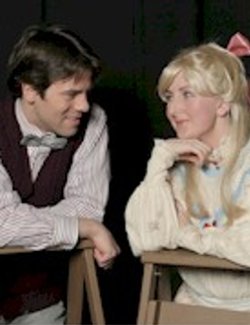
North York Mirror
In February 1938, Thornton Wilder's play OUR TOWN had its Broadway premiere attracting critical praise and the prestigious Pulitzer Prize for drama.
The play's enduring popularity is due to Wilder's sensitive writing and to his unique staging conceit: A bare stage with only a few chairs and tables.Into this space, a stage manager/narrator conjures up the town of Grover's Corners, New Hampshire in 1901. His description of the town is given with such detail that only the most obstinate audience members will fail to see it.
We are quickly introduced to the main characters and observe them throughout a routine day: the women doing the baking and gardening, the men tending to their professions, the children off to school. Nothing remarkable happens. Just Life.
The second act presents another day but one rather more special: the wedding of two of the town's younger members, recent high school graduates Emily Webb and George Gibbs. Here, some deft comments are made on love and marriage.
The third act takes us to the graveyard just outside the town and the afterlife of some of the characters. The "routine" we witnessed earlier is partially replayed causing one of the leading players to break down. "It goes so fast" she sobs "We don't have time to look at one another."
What started out as a simple little play winds up being profoundly moving. Or at least it can be, if done correctly. Fortunately, Stage Center Productions does it very correctly. Under the firm leadership of director L.Garth Allen the performances are nicely shaded. The frivolousness of the first act yields to a thoughtful second act and heartbreaking third.
Judy Gans and Robin Phillips as the two mothers create a ballet of motion as they scurry about their work, pausing to gently scold their children or provide an occasional word of encouragement to their husbands. With little more than period costumes they immediately conjure up the essence of the woman's role in keeping a home at the turn of the century running smoothly.
Their husbands are both professional men: a doctor played with proper jovial authority by Alan Washbrook, and a knowledgeable newspaper editor enacted by Bob Martyn.
As their offspring, Jeffrey Bate Boerop and Jill Frazer have more varied roles. Boerop goes from a gawky teen boy obsessed with baseball to a love struck young man anxiously marrying the girl next door. His performance is strong enough to retain presence through the third act when his character is hardly seen.
It is in this final segment of the play that Jill Frazer is given her moments to shine and it is she who makes the play's poignant comment that life is "too wonderful for anybody to realize." She shares that comment with the stage manager, a role played here with a wonderful folksy charm by Brian Kipping. He cheerfully introduces us to the Gibbs and the Webbs and the other inhabitants of Grover's Corners.
A classic play is given an effective staging by a terrific cast.